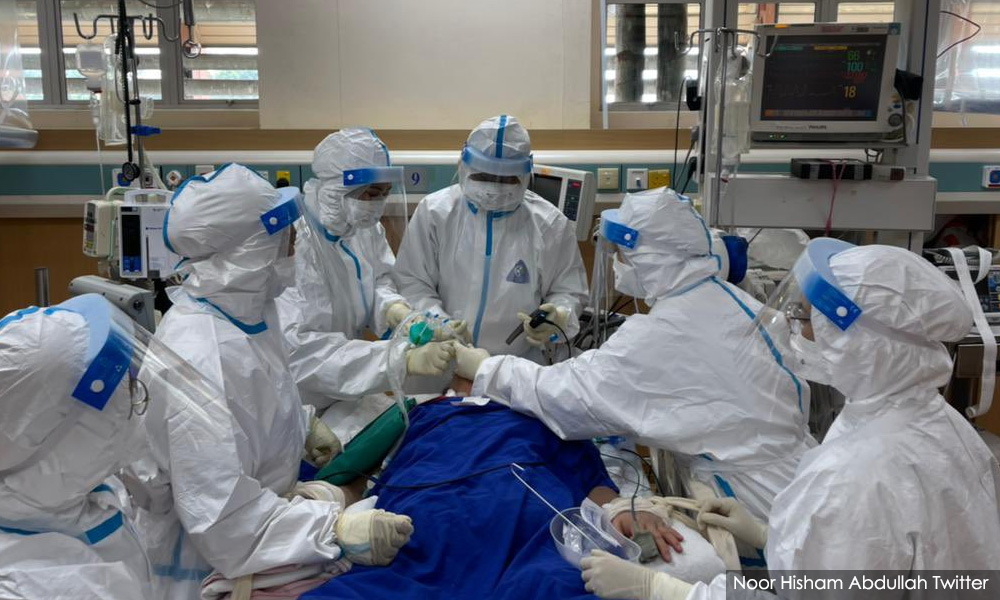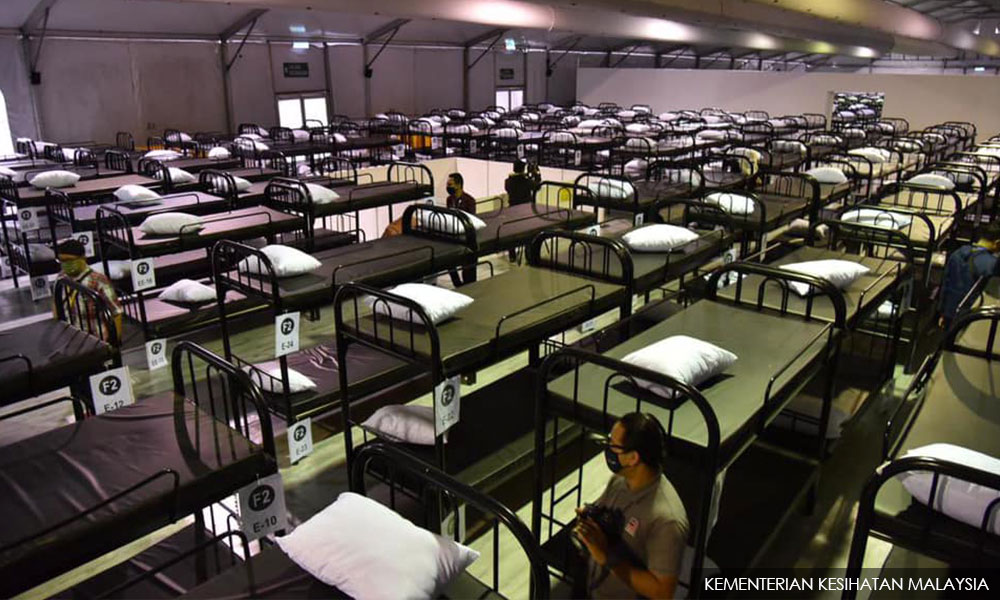LETTER | Flashbulb memories are highly detailed, exceptionally vivid “snapshots” of the moment and circumstances in which a piece of emotional arousing news was learned about. Evidence has shown that people are able to retain surprisingly accurate and specific information regarding what was happening around them when such news was broken.
For example, what were you doing when Prime Minister Muhyiddin Yassin announced on live telecast that “we are a nation at war with invisible forces (referring to the Covid-19 pandemic)”?
I can tell you precisely what I was doing when that announcement was made. I had just taken my bath after doffing off my Personal Protective Equipment (PPE), having done my ward rounds tending to patients with Covid-19. At that time, this message resonated powerfully for me and other healthcare workers because to us, in the war against the pandemic, our hospitals have been turned into a metaphorical battlefield.
Ernest Ng’s Covidball Z comic depicted the director-general of health as a sword-wielding war general, which reflects the position of healthcare professionals as soldiers at the battlefront (hence the moniker of ‘frontliners’).

The PPEs are the white and blue suits of armour. Stethoscopes and ventilators, the weapons in their hands. The wards and Intensive Care Units, the barracks they operate in.
As the pandemic invaded the nation, these men and women put on a mask of courage and the Malaysia 'boleh' spirit, determined to keep the rakyat healthy and the virus at bay. At the same time, researchers raced against time, developing and adding vaccines to the arsenal available to the troops.
There were stretches where it seemed as if we were winning. The numbers of infected citizens were low, the curve was flattened, and the nation worked together as a whole to ensure our healthcare system could cope.
However, before a victory banner could be raised, the situation took a turn for the worse. Many factors are involved, including, but not limited to, the virus evolving and adapting itself to the conditions, mutating into variants of concern which were able to spread faster and cause more destruction.

Today, our infirmary is full of citizens, charting record-high numbers each day. The barracks are utilised at full capacity. The number of casualties has increased tremendously. All these signify that the army is not able to fight this war alone anymore.
And thus here we are, 15 months later on Groundhog Day, preparing for a lockdown once more. This is a health emergency that has been going on for far too long. Our troops are exhausted, our resources depleting. Our army, the one which has been under tremendous strain since it all began, is on the verge of collapsing. It needs aid, and this can only be provided through mobilising a 'war budget'.
In the meantime, I propose some items that ought to be at the forefront of the minds of our strategists at this moment in time:
- Ensure our troops have what they need, and their barracks well-equipped. In the words of George S Patton, “wars may be fought with weapons, but they are won by men”. It is important to meet the basic needs of our soldiers, the healthcare professionals, to have a chance of winning this war.
- Keep our troops well fed. Make them feel safe by ensuring they have adequate armour and weapons so that they are able to concentrate on the job at hand. Besides that, see to it that they are well-rested (ensure reasonable resting areas that allows for physical distancing). Allowing adequate rest is a tricky business - for that to occur, we have to ensure adequate troop numbers.
- Channel all available troops to priority areas where their services are required most, that is, at the hospitals, quarantine and low-risk treatment centres, and Covid Assessment Centres. In their absence, we can obtain reinforcements by enlisting medical, nursing, and pharmaceutical students to vaccination centres.
Caveats have to be involved: fully registered healthcare professionals must be present in case of adverse effects; proper training has to be provided to these students; they have to be covered appropriately by insurance (and that they have to be vaccinated as well), but this frees up a number of healthcare professionals to the wards and ICUs, where arguably, is where they are needed most.
We have to be cognizant of the fact that we cannot mass produce high-quality troops in a short amount of time, hence it is important to make sure those in service remain productive by taking good care of their needs.
- Ensure adequate mental health support is provided to the troops. Dealing with a situation as severe as the Covid-19 pandemic is unprecedented in Malaysia, and the fallout, especially psychologically, will be massive. There are already cries of burnout and rising mental health concerns raised by healthcare professionals, brought about not only by the sheer amount of patient load, but also the enormous numbers of fatalities involved.
Studies across the globe have suggested that healthcare workers are at risk of developing Post Traumatic Stress Disorder (PTSD), and we will do well to provide them with adequate mental health support so that its damages are minimal.
- Forge alliances with other experts where necessary. As the lyrics of the award-winning song Glory goes, “no one can win the war individually; it takes the wisdom of the elders and young people’s energy”, so too must we work with all available operatives to maximise our forces. One such agency exists in the form of the Expert Advisory Group, made up of top healthcare personalities, which is flanked by 10 subcommittees covering a variety of issues designed to provide policy suggestions and advice on matters related to the Covid-19 pandemic management. They are not here to compete but instead complement existing measures. At this time of need, we can really incorporate their expertise and experience into our ranks.
In the midst of an all-out war against the Covid-19 pandemic, our healthcare professionals are incredibly important national assets. While they do not protect the physical borders of Malaysia from corporeal breaches, they are leading our war against the microscopic pathogen with colossal economic and social impacts. Despite these healthcare professionals being engaged on the Covid-19 battlefront, they are in fact the last bastion between patients and death.
And the government ought to be pulling out all the stops in supporting them.
The views expressed here are those of the author/contributor and do not necessarily represent the views of Malaysiakini.

